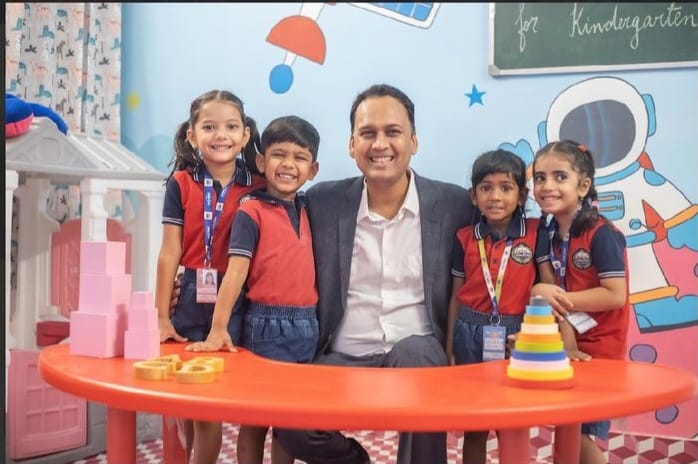In an exclusive conversation with News Outlook, Pritam Kumar Agrawal, the visionary Founder of Hello Kids, shares how his journey began with a simple yet powerful mission—to make quality early childhood education accessible to every child in India, regardless of their location or background. From pioneering a “No Royalty” franchise model to redefining preschool infrastructure and pedagogy, Hello Kids has grown into one of the country’s largest preschool networks with over 1030 centres. Agrawal reflects on the brand’s evolution, its response to changing parental expectations, and the road ahead as it continues to expand into Tier 2 and Tier 3 cities with an inclusive, tech-enabled, and culturally rooted approach to early learning.
1. Hello Kids has become a trusted name in early childhood education across India. What inspired the vision behind building such a large preschool network?
The vision behind Hello Kids was always rooted in accessibility and quality. We recognized a gap in the market—where early childhood education was either prohibitively expensive or lacked quality standards in semi-urban and rural areas. Our goal was to bridge that gap by offering structured, value-based learning that’s both affordable and impactful. Over the years, our “No Royalty” franchise model empowered passionate edupreneurs, enabling us to expand rapidly while maintaining consistency in quality. Today, with over 1030 centres across India, Hello Kids stands as a testament to the belief that quality education should not be a privilege, but a right for every child—regardless of their geography or economic background.
2. How does Hello Kids balance safety, creativity, and learning while designing its preschool infrastructure?
At Hello Kids, infrastructure is more than just buildings—it’s about creating a secure, stimulating, and child-centric environment. Safety is our top priority, ensured through stringent standards, age-appropriate furnishings, non-toxic materials, and regular audits across centres. At the same time, we design spaces that encourage creativity—through thematic classrooms, interactive zones, and sensory-rich play areas. Every element, from wall colours to classroom layout, is chosen to inspire curiosity and joy. We believe that when children feel safe and excited about their environment, meaningful learning naturally follows.
3. In what ways does your teaching approach differ from traditional preschool models?
Our teaching approach is a harmonious blend of Montessori, Playway, and Multiple Intelligences frameworks—carefully tailored to suit the Indian context. Unlike rigid traditional models, Hello Kids encourages exploration, hands-on activities, and experiential learning. We focus on holistic development—cognitive, social, emotional, and physical—rather than just rote academic milestones. Our curriculum integrates storytelling, music, art, and movement to nurture a child’s creativity and individuality. Moreover, we regularly update our content to ensure it’s aligned with global standards while staying rooted in Indian culture and values.
4. With changing parenting expectations post-pandemic, how has Hello Kids adapted to meet new-age demands in early education?
Post-pandemic, parents are seeking not just academic support, but also emotional wellbeing, digital readiness, and health assurance. Hello Kids swiftly adapted to these evolving needs. We introduced hybrid learning modules to support continuity of education during lockdowns. We’ve strengthened our focus on mental wellness through structured routines and emotional expression exercises in class. Additionally, we now provide more transparency and regular parent-teacher interactions via digital platforms. We also implemented enhanced hygiene protocols across all centres, reinforcing parental confidence in sending their children back to school.
5. What is your long-term vision for Hello Kids, especially in terms of curriculum innovation and expansion into Tier 2 and Tier 3 cities?
Our long-term vision is to become the most accessible and trusted preschool brand in India, especially in Tier 2 and Tier 3 cities where quality early education is often limited. We aim to reach 2000+ centres over the next few years by empowering more local entrepreneurs through our low-investment, high-support franchise model. On the curriculum front, we’re investing in technology-led tools, personalised learning paths, and continuous teacher training. We also plan to integrate more regional languages, cultural exposure, and sustainability-focused modules—ensuring our children are not just school-ready, but life-ready.


